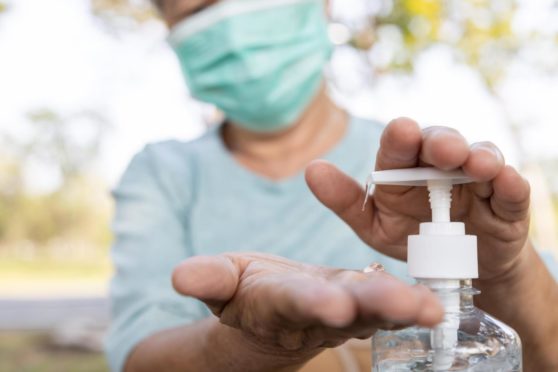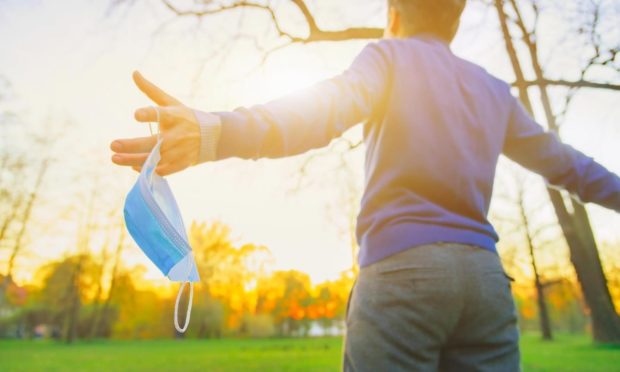This weekend is the first time for months where we can meet friends and family again. But how do we start to ‘get back to normal’ with lingering worries about Covid-19? A Perth psychologist reveals how to spot and deal with societal anxiety.

“Things were worrying at the beginning but, like anything, we got used to it,” says psychotherapist Rachel Weiss of Perth-based counselling service Rowan Consultancy.
“The next challenge will be how we’ve adapted perhaps too much. Somebody called it ‘convalescing’ as a whole society. You know that period in between when you’re really ill and when you’re back. We’re going to go through this period of adjustment.”
How quickly will we ‘return to normal’?
“It will take several months at least, since we are opening society gradually.
“It’s not just one change we need to get used to, but a series of changes as the levels reduce,” says Rachel.
“It’s like taking away a plaster cast. When my leg was in plaster I was counting the days until the cast was removed, I was excited. But when the cast came off, I felt wobbly emotionally and physically and had to build up my leg muscles and confidence again.
“Coming out of lockdown and mingling again will be like that, a slow gradual process. We’ll need time to build our socialising and travelling muscles again and to adjust.”
What issues might that cause for some people?
“This variety amongst individuals will be a major issue eg in a family where some members want to hug and sit close, while others are still wary.
“In the workplace, we will need to learn to accommodate our colleagues’ differing levels of comfort with proximity, ventilation etc. We are all on the same road towards mingling more, but we are travelling at different paces, from different starting points.
“Someone who has lived alone for the last year, shopping online and not meeting anyone, may feel different to someone who has a schoolchild and a partner who is a key worker.

“Or it may be the person living alone is really keen to return to mingling, while the parent has an underlying health condition and is more wary.”
“We have become wary of close contact with other people, seeing that as a risk to our lives. It will take time to readjust to the lower risk.
“The main challenge is adjusting to the change and learning to live with ongoing, low-level risk.”
What might be the signs that someone is suffering with anxieties?
“Reluctance to meet up or avoiding meeting in person. Fretting about hygiene, wiping seats and shopping and post, even though we now know that surface transmission is relatively low.
“Anxiety shows in our bodies too, for example through raised heart rates, shallow breathing, tense muscles especially neck and shoulders.”
What tips do you recommend to help people deal with this?
“Self-compassion is a good way to help yourself. Dr Kristin Neff has some great tips.”
1) Acknowledge you are finding this difficult, eg “I am scared” “I am worried”
2) Recognise others are feeling this too, you are not alone and it’s natural to feel this
3) Be kind to yourself and start with small steps: go to town at a quieter time, meet one person before meeting a group, meet outdoors before going to a café. Build up gradually and give yourself a treat each time you push yourself out of your comfort zone.
4) Talk to someone you trust to take your seriously, a good friend.
5) Look at the stats, for example in Dundee this week there are about 25 cases per 100,0000 people. The population of Dundee is 150,000, so that means there are about 38 people in Dundee who have Covid-19.” There are no Covid patients in Tayside hospitals.
To help others, be a good listener: validate their fears, reassure them this is usual and won’t last forever.
What are the opportunities for us as a society, having gone through this difficult period?
“For us to talk more openly about mental health. We all have mental health, we are all anxious sometimes. I think the pandemic has made us more willing to acknowledge this and to share our tips for looking after our mental health.
“At Rowan Consultancy, we have received many more invitations from employers to facilitate bite-size mental health awareness sessions. People realise they need to look out for one another, that it’s OK to ask for help, that we can all be vulnerable.
“We realise what’s important to us: we now value our friends more and simple pleasures like sitting in the spring sunshine, sipping a cup of tea, having enough food – things we maybe took for granted before. We’ve been reminded of our physical vulnerability and mortality, so let’s appreciate life while we have it and make the most of it!”

